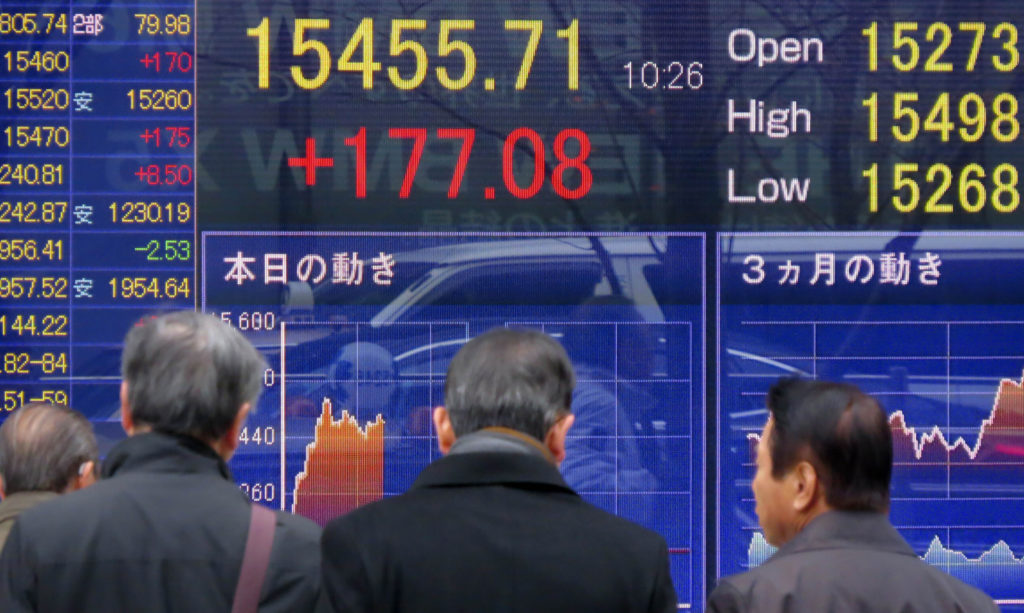
Asian markets closed mixed and the dollar slid to multi-month lows against the yen on Wednesday.
The Nikkei 225 closed lower by 0.43 percent, or 90.51 points, at 21,154.17 after reversing gains seen earlier. The index fell as much as 1.42 percent at one point and touched its lowest levels in four months ahead of the release of U.S. inflation data later in the day. Those moves were accompanied by the dollar falling to 15-month lows against the yen.
Automakers closed the session in negative territory, with Toyota and Honda Motor lower by 2.12 percent and 1.15 percent, respectively. Technology shares were also mostly lower, with SoftBank Group declining 2.41 percent by the end of the day.
Toshiba bucked the trend to climb 1.92 percent. The company announced on Wednesday that it would appoint Nobuaki Kurumatani as chairman and chief executive.
Among other heavyweights, Fanuc Manufacturing fell 1.38 percent. Fast Retailing shed 0.1 percent by the end of the session.
Meanwhile, fourth-quarter Japan gross domestic product data released on Wednesday showed the economy grew at an annualized 0.5 percent, below a median forecast of 0.9 percent, Reuters reported.
Across the Korean Strait, the Kospi advanced 1.11 percent to close at 2,421.83, with Samsung Electronics extending gains and climbing 3.07 percent. Other technology names were mixed: SK Hynix slipped 0.13 percent and LG Electronics lost 2.02 percent on the day.
Shares of Lotte Corporation closed down 6.02 percent after Lotte Group Chairman Shin Dong-bin was sentenced to two years and six months of jail as part of a wider political scandal in South Korea. Lotte Shopping stock ended the day lower by 2.28 percent.
Down Under, the S&P/ASX 200 shed 0.25 to close at 5,841.2, with the heavily weighted financials sub-index dragging on the broader index. The sector edged down by 0.72 percent as most of Australia’s “Big Four” banks closed the session lower: Commonwealth Bank of Australia fell 3.04 percent and ANZ was lower by 0.29 percent.
In other individual stocks, Australian department store operator Myer jumped 4.67 percent after the retailer announced Wednesday that Chief Executive Richard Umbers was stepping down. The search for Umbers’ replacement has commenced immediately, Myer said in a statement.
Greater China markets were in positive territory, although trade was thin ahead of the Lunar New Year holidays. Hong Kong’s Hang Seng Index rose 1.73 percent by 3:00 p.m. HK/SIN, with financials logging a strong performance. China Construction Bank added 4 percent to contribute 106 points to the benchmark’s 532.52-point gains around an hour before the market close. HSBC gained 2.26 percent and insurer AIA rose 1.06 percent at 3:03 p.m. HK/SIN.
Tech heavyweight Tencent rose 2.23 percent, as did most other technology sector shares. Sunny Optical advanced 4.03 percent by 3:05 p.m. HK/SIN.
Mainland markets carved out moderate gains ahead of the long Lunar New Year holiday despite slight declines seen earlier in the day. The Shanghai composite tacked on 0.46 percent to close at 3,199.48 while the Shenzhen composite gained 0.48 percent to end at 1,739.15.
Mainland China markets will close from Feb. 15 to Feb. 21 while Hong Kong markets will be shut from Feb. 16 to Feb. 19 for the Lunar New Year. Other regional markets, including South Korea, Taiwan and Singapore, will also finish the week early due to the holiday.
Vietnam’s markets were closed on Wednesday for the Lunar New Year holidays.
Meanwhile, markets awaited the release of U.S. inflation data on Wednesday during U.S. hours.
“A strong U.S. core CPI would likely lead to lower global equity prices, higher U.S. bond yields, and a stronger dollar against most currencies with the possible exception of the safe haven Swiss franc and yen,” Joseph Capurso, a currency strategist at Commonwealth Bank of Australia, explained in a morning note.
In currencies, the dollar index, which tracks the U.S. currency against a basket of six rivals, extended losses to trade at 89.519 by 3:06 p.m. HK/SIN. That was below the 90 handle seen earlier this week.
Meanwhile, the yen rose to its highest levels in fifteen months earlier in the session. The dollar last traded at 107.23 after slipping as low as 106.82 earlier.
Earlier on Wednesday, Chief Cabinet Secretary Yoshihide Suga said the Japanese government would watch moves in the market and noted that foreign exchange stability was key, Reuters reported.
Elsewhere, the Dow Jones industrial average closed higher by 39.25 points, or 0.16 percent, at 24,640.45 after slipping as much as 180.24 points on Tuesday. Other major U.S. indexes also closed with gains.
Those gains were a continuation of the rebound from massive losses seen last week: Major U.S. indexes closed in correction territory on Thursday last week after sliding more than 10 percent below their 52-week highs. Markets had been concerned about rising interest rates influencing the Federal Reserve’s interest rate hike path.
A survey from Bank of America Merrill Lynch Global Report released Tuesday found that there was a record one-month increase in the net percentage of investors who said they were taking out protection against a sharp fall in equity markets in the next three months.
On the commodities front, oil prices were steady after settling little changed in the last session as markets focused on global oil supply and the softer dollar.
U.S. West Texas Intermediate slipped 0.1 percent at $59.13 per barrel. Brent crude futures edged up 0.08 percent to trade at $62.77.
























